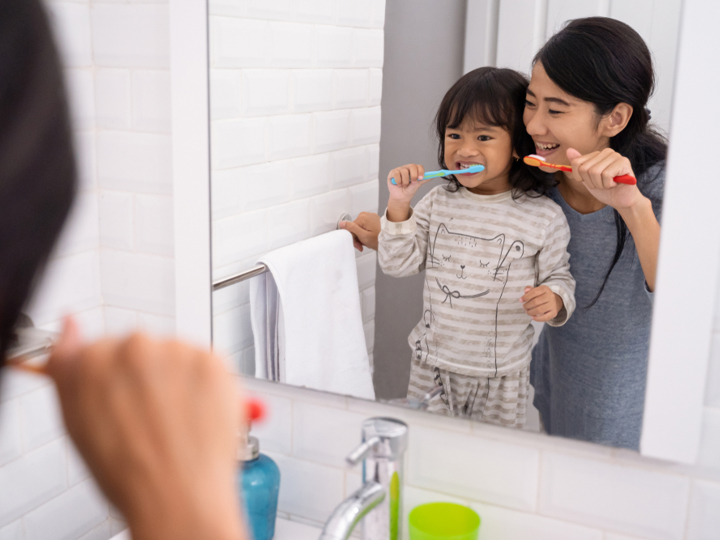Dental health
- 0-1 Years
- 1-5 Years
- 5-11 Years
- 11-19 Years
- SEND
- Feeding and eating

It's important to take care of your child's teeth. The best way to take care of their teeth is to brush them for 2 minutes, twice a day. They should also visit a dentist for regular check-ups and try limiting sugary drinks and sweets to mealtimes only.
Explore the topics on this page:
Need urgent dental care?
Read more about accessing an NHS dentist in an emergency or out of hours.
If you do not have a dentist, find one by calling NHS 111.
Brushing your child's teeth
Brushing teeth regularly is important for good oral hygiene. It can also help prevent tooth decay. Children should brush their teeth twice a day for 2 minutes at a time, using fluoride toothpaste. After brushing they should spit out the toothpaste but shouldn’t rinse their mouth.
You can start brushing your baby’s teeth as soon as they get their first tooth. Read more about hygiene for infants.
Carry on helping your child brush their teeth until you are sure they can do it well enough themselves. This will normally be until they are at least 7 years old.
Top tips for brushing your child's teeth
- Try to make it fun. You can try using reward charts.
- Let your child choose their toothbrush and toothpaste. But do make sure you select the right size toothbrush for your child’s mouth. Make sure you use a toothpaste that contains the right amount of fluoride for your child's age. Mild-flavoured toothpastes are available if your child prefers.
- Let your child see themselves in a mirror when brushing.
- Try a footstool to help your child reach the basin.
- Use a toothpaste pump dispenser if your child struggles to put the right amount of toothpaste on their brush.
For more information on when to start brushing your baby's teeth read more about infant hygiene.
Other ways to look after your child's teeth
Brushing your child's teeth twice a day is the main way to take care of their teeth. But there are other things you can do to help look after them.
Register your child with a dentist as soon as possible. NHS dental care is free for children. You can take your baby to the dentist as soon as their first milk teeth appear. Continue to take your child for regular dentist appointments. Read more about how to find an NHS dentist.
Try to cut down on sugar, as it can lead to tooth decay. You can also try to limit sugary drinks and sweets to mealtimes only. It is recommended that children stick to milk and water where possible. Read more about healthy eating.
Young people can start to use dental floss or intra-dental brushes from the age of 12. A dental health professional can provide your child with a demonstration of what to do. Chewing sugar free gum can also lower the acid in saliva and promote a healthy mouth.
How to help if your child has sensory issues
If your child has sensory issues you can decrease the sensitivity by:
- applying pressure to the teeth and gums
- trying an electric toothbrush as the vibration my be calming
- considering using a flannel to wipe the teeth
If your child has a diagnosis, complex needs or a genetic condition, discuss this with your local dentist. They may want to consider onward referrals to a specialist paediatric or hospital dental service.
Need more specific support for your child?
If your child needs more help or has additional needs, you can visit our specific section for extra support.
Last reviewed: 1 November, 2024
